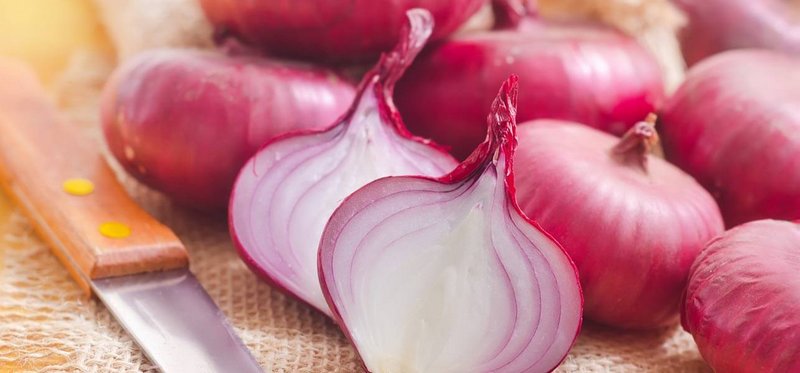Onion is a vegetable popularly used to season various foods and its scientific name is Allium cepa. This vegetable has several health benefits, as it has antiviral, antifungal, antibacterial, anti-inflammatory, anticancer, hypoglycemic and antioxidant properties, so consuming onions regularly is a great way to maintain heart health.
There are several types of onion, the most popular being yellow, white and purple, and can be eaten raw, preserved, fried, baked, grilled or in rice and sauces, for example.
Main benefits
The main benefits of onion consumption in everyday life are:
- Decreased LDL cholesterol and triglycerides, as it contains a substance known as saponin, which reduces the risk of developing heart diseases, such as atherosclerosis or heart attack;
- Decreased blood pressure, as it contains alliin and antioxidants that promote the relaxation of blood vessels, improving blood circulation. In addition, it could act against platelet aggregation, reducing the risk of blood clots that can favor the development of a stroke, for example;
- Helps prevent and fight diseases like the flu, colds, tonsillitis, asthma and allergies, as well as cancer and Candida albicans, this is because it is a food rich in quercetin, anthocyanins, vitamins from the B and C complex and other antioxidant compounds that provide antimicrobial and anti-inflammatory action;
- Prevention of premature aging, as it is rich in antioxidants, which protects the body’s cells from damage caused by free radicals;
- Helps regulate blood sugar, as it contains quercetin and sulfur compounds that have hypoglycemic properties, making it an excellent option for people with diabetes or pre-diabetes.
Also, some studies have found positive results when raw onion juice is placed on the scalp as it could help in treating hair loss and alopecia.
Onion also has an expectorant action, which helps to reduce secretions and improve coughing. Here’s how to prepare onion cough syrup.
Onion nutritional information
The following table indicates the nutritional information per 100 grams of onion:
| components | raw onion | boiled onion |
|---|---|---|
| Energy | 20 kcal | 18 kcal |
| proteins | 1.6 g | 1 g |
| fats | 0.2 g | 0.2 g |
| carbohydrates | 3.1 g | 2.4 g |
| Fiber | 1.3 g | 1.4 g |
| Vitamin E | 0.3 mg | 0.15 mg |
| Vitamin B1 | 0.13 mg | 0.1 mg |
| Vitamin B2 | 0.01 mg | 0.01 mg |
| Vitamin B3 | 0.6 mg | 0.5 mg |
| Vitamin B6 | 0.2 mg | 0.16 mg |
| folates | 17 mcg | 9 mg |
| Vitamin C | 8 mg | 5 mg |
| Calcium | 31 mg | 33 mg |
| Magnesium | 12 mg | 9 mg |
| Phosphor | 30 mg | 30 mg |
| Potassium | 210 mg | 140 mg |
|
Iron |
0.5 mg | 0.5 mg |
It is important to keep in mind that all the benefits mentioned above can be obtained not only through the consumption of onions, it is also important to maintain a balanced and varied diet, as well as a healthy lifestyle.
how to consume
Onions can be eaten raw, cooked, in sauces or pickled. However, the amount to obtain its benefits is still not very well established, but some studies indicate that at least 25 grams per day should be consumed.
In addition, onions can be obtained in the form of syrup or essential oil, in which cases it is recommended to consume 1 tablespoon 3 times a day.
onion recipes
Some delicious recipes that can be prepared with onions are:
1. Onion dressing for salads and sandwiches
Ingredients
- ¼ raw onion;
- ⅓ cup of olive oil;
- 2 sprigs of mint;
- 1 teaspoon of vinegar;
- 1 teaspoon of sesame;
- 1 pinch of brown sugar;
- Salt to taste.
Method of preparation
Finely chop the mint and onion. Mix all ingredients and refrigerate until serving time.
2. Onion muffins
Ingredients
- 2 cups of rice flour (or all-purpose flour);
- 3 eggs;
- 1 cup of milk;
- 1 tablespoon of olive oil;
- 1 tablespoon of chemical yeast;
- 1 teaspoon of flaxseed;
- Salt and oregano to taste;
- 1 chopped onion;
- 1 cup of white cheese.
Method of preparation
Beat the eggs, oil, milk, cheese and seasonings in a blender. In a separate bowl, combine the flour, baking powder, flaxseed and chopped onion. Mix the dry ingredients with the wet ones and put the mixture in individual molds.
Preheat the oven to 180ºC and put the mixture in the oven for 25 to 30 minutes. To decorate, add a little cheese on top of the dough and leave it in the oven for another 3 to 5 minutes, or until golden.
3. Canned onion
Ingredients
- ½ cup apple cider vinegar;
- 1 tablespoon of sugar;
- 1 and ½ tablespoon of coarse salt;
- 1 red onion.
Method of preparation
Wash and peel the onion, then cut it into thin slices. Mix the vinegar, sugar and salt in a small glass jar until the salt and sugar are completely dissolved. Finally, add the onion to the mixture and close the jar. Store the onion in the refrigerator for at least 30 minutes before consuming.
Ideally, onions should rest for 2 hours before consuming and can be used for up to about 2 weeks after cooking, although they taste best during the first week.
